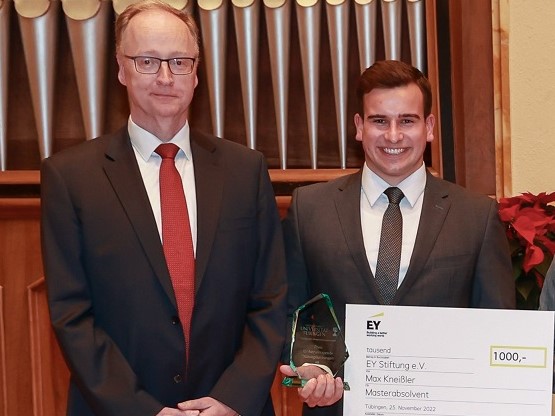Top News
06.02.2023
Max Kneißler: 2. award for his Master's thesis
Every year, EY awards prizes for the best bachelor's and master's theses at the Department of Economics. WIWI NEWS interviewed the awarded Max Kneißler about his work, his motivation for this study and his career planning.
WiWi NEWS:
Mr. Kneißler, you have been honored with the 2nd prize from EY in 2022 for your Master's thesis in Data Science and Business. The prize money was 1,000 Euros - congratulations! Why did you decide to study Data Science in Business and Economics in Tübingen?
The University of Tübingen was known to me from my bachelor studies (International Business Administration) as an excellent choice. Already during my bachelor studies I got to know very nice and competent fellow students and was convinced by the comprehensive teaching in the different fields of business administration. Actually, I wanted to change my place of study for the Master's program in order to gain new experiences. However, I was quickly convinced by the relatively new Data Science program in Tübingen. In addition, the exchange with some professors helped me to find out that the program fits perfectly to me and my profile. Towards the end of my bachelor's degree, I was already aware that I wanted to deepen data-driven analytics, as my internships and working student positions underscored its enormous importance for companies. In addition, I personally have always been a data- and number-driven person, so the program was an ideal fit for me.
What is your thesis "The Quest for a Modern and Dynamic Budgeting and Forecasting Approach - Literature Review, Expert Interviews and Empirical Analysis about the Corporate Budgeting and Forecasting Process " about?
During my work as a student trainee I got to know the budgeting and forecasting process (controlling activities) of the company in detail. However, I disliked this process because it was characterized by inefficiencies. Thus, in my thesis I worked out a dynamic process, which had the goal to update itself just-in-time and to unify the budgeting and forecasting process. I worked this out through literary research, qualitative expert interviews and a quantitative time series estimation. This allowed me to test my business knowledge in a real-world problem situation and support it with a data-driven solution - the ideal end to my academic career.
What are you doing now and what does your future career plan look like?
A few days after I handed in my thesis, I joined the Junior Manager Program at Robert Bosch GmbH. There I am completing a two-year "training to become a future manager". In this program, I gain experience in 6-7 different departments and business units for 3-4 months each, in order to get to know different facets of the Group in Germany and abroad. My program is based in Finance, Accounting & Controlling, where currently, for example, many applications are automated by data-driven tools. There will also be a focus on building up the internal network and leadership training. After completing the two years, I am aiming for a management career in the Bosch Group.
Interview: Dr. Ramona Gresch

